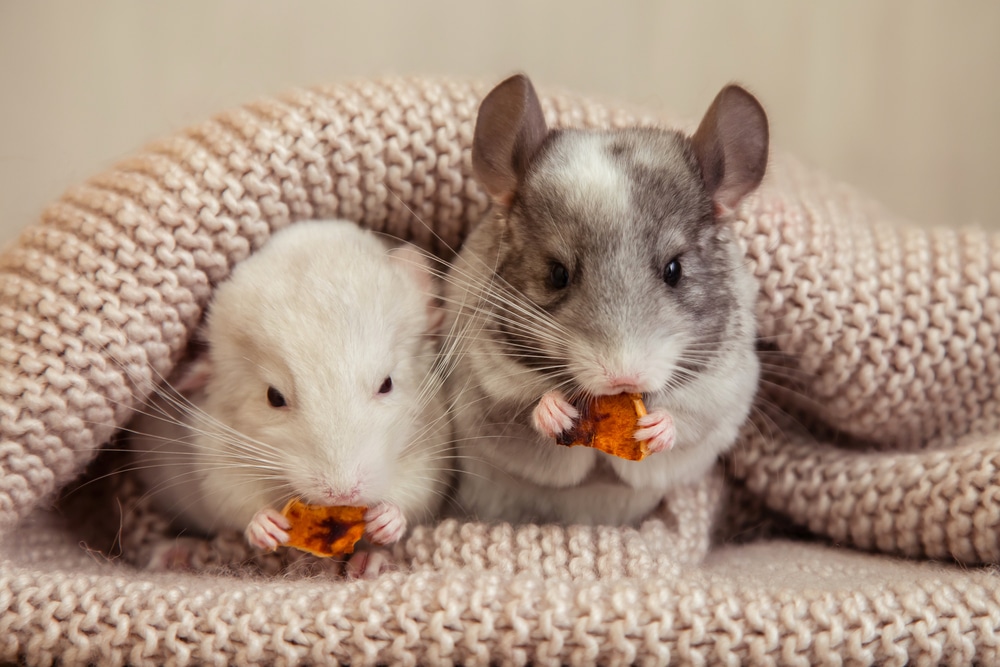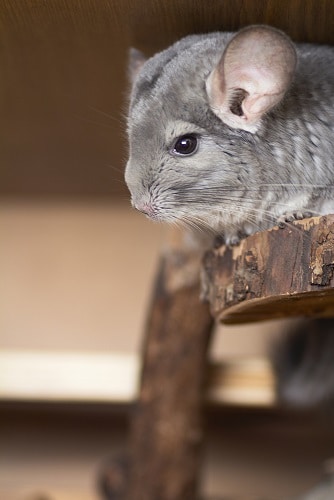
Chinchillas are similar to rodents, usually giant than hamsters and rats, and have a longer lifespan than any other rodent species. However, chinchillas are rare and considered exotic pets because only reputable breeders can get you a pet chinchilla.
If you are looking for a clean, attractive, and active rodent as a pet, you should consider petting a chinchilla. They are cute little creatures and are appropriate enough for adults as well as children.
Although basically, chinchillas are not hard to keep around, they need a clean cage, food, chewy pellets, and a room with a maintained temperature.
Chinchilla As A Pet Pros And Cons
A chinchilla requires time and financial commitment, just like any other pet. Here are some things you should know before petting a chinchilla.
Pros Of Petting A Chinchilla
1. They Are Low Maintenance
Chinchillas are low-maintenance pets and don’t need much to be satisfied. This is one of the reasons why people prefer petting them. You have to ensure they have enough hay, water, food, and plenty of secure chew toys.
Additionally, you don’t have to clean their cage every day. Cleaning once a week is enough as opposed to daily litter box cleaning, which most pets usually require.
2. Chinchillas Are Very Social
Chinchillas are very social and get along well, unlike other rodents who prefer living alone. Chinchillas stay in groups to defend one another from predators in the wild.
If you want to pet a chinchilla, we recommend you adopt at least two chinchillas so that they can develop healthy social bonds. It’ll increase their lifespan, and this increased social connection will likely boost their long-term mental health.
Chinchillas can develop a strong bond with their owners if given the proper care. Chinchillas are affectionate and often docile. So if yours is always cuddling up to you, you’re taking good care of it.
3. They Are Playful
Chinchillas love to play. Therefore you must suffice them with suitable toys and entertainment. They love wooden chew toys, which allow them to munch on something. They also enjoy tunnels and exercise wheels.
Giving them things to climb on is another approach to keep them entertained and active because they also want to climb.
Playing with your chinchilla allows you to learn more about its personality, which is the most excellent part. The best way to get to know a chinchilla is through playtime because each one is special.
4. Chinchillas Have A Long Lifespan
Although the average lifespan of a chinchilla is usually ten years, your pet chinchilla can live up to more than 20 years if you take good care of it.
Some pet owners are always worried about losing their pets, but if you have a chinchilla, you shouldn’t be concerned about losing your little being.
Cons Of Petting A Chinchilla
Petting a chinchilla has its cons. You should know about them before you decide to pet one for yourself.
1. Chinchillas Require Dust Bath Regularly
Although it may seem unattractive to you initially, dust bathing is the primary maintenance for chinchillas. Regular dust baths are part of chinchilla care since it helps maintain their coat health and silkiness.
Furthermore, a dust bath stops the fur from becoming overly greasy. It can be messy, and some owners have even mentioned experiencing allergic responses to the dust bath products, which can be unfortunate.
You can not bathe your chinchilla with water like other pets; they are more prone to catching allergies and infections when wet.
Their dense fur holds the moisture, and if you let them wet for a long time, they’ll be sick and have skin infections.
2. Chinchillas Can’t Be Around Other Pets
Chinchillas only like to be around their species and can develop attachments to trustworthy humans. If you have another pet, you should reconsider your decision to pet a chinchilla as they don’t like to be around other pets.
Dogs and cats naturally hunt chinchillas in the wild. A chinchilla will instinctively see a dog or cat as a predator and become anxious.
Chinchillas are also irritated by rabbits and other rodents like rats or hamsters. A domestic chinchilla might regard these other animals as competitors for food or territory because they all provide the same natural function.
Only a chinchilla can get along with other chinchillas. Any other animals will make them anxious and negatively affect their enjoyment as pets.
3. Chinchillas Are Nocturnal
Most rodents are naturally more active at night than during the day, which applies to chinchillas. You might have trouble falling asleep as the noises of them eating, playing, and moving around will probably keep you awake.
This implies that a pet chinchilla will be more inclined to nap during the day than to play with you. You might feel alone during day time when your chinchilla is sleeping.
Petting a chinchilla means you’ll have to adjust accordingly and take care of their routine and nap time.
4. They Might Aggravate Your Allergies
Chinchillas don’t cause allergic reactions, but the food they eat, especially hay, may cause reactions in pet owners if they have grass or hay allergies.
Due to their sensitive stomachs, chinchillas can only eat a lot of hay and grass, which accounts for most of their diet. Therefore you must not overlook any allergies due to hay or grass.
Bottom Line
The choice to adopt a chinchilla is ultimately yours. Chinchillas have pros and cons, which must consider before making them your best bud.
There are several advantages of keeping a pet chinchilla, such as they are playful and like to be around you, and enjoy your presence.
On the other hand, they are bad for your allergies and are up at night, and might disturb your sleeping schedule. So keep this list in mind the next time you consider adopting a chinchilla. It’ll help you decide whether a chinchilla is a suitable pet for you.


chinchillas are amazing and I love them.